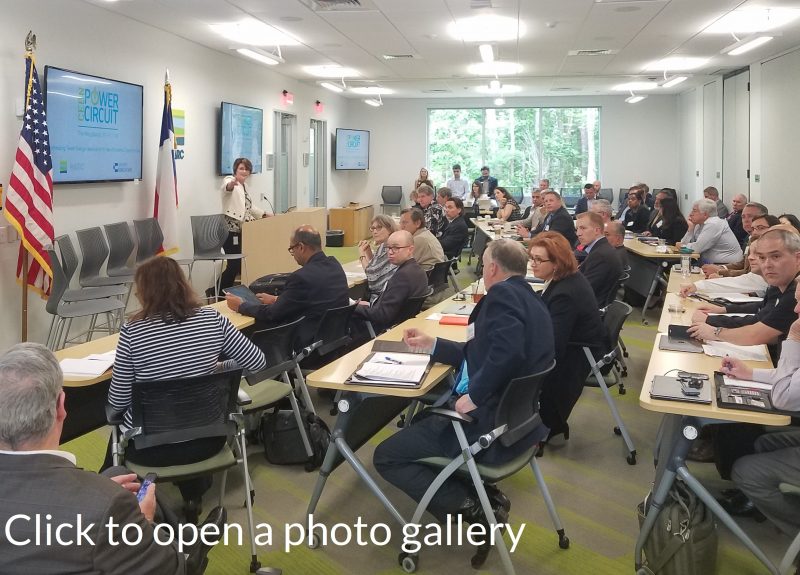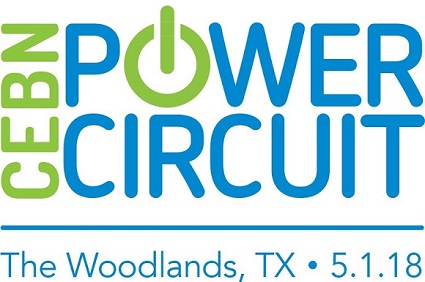Blog | Just Transition
August 29, 2022
May 7, 2018 | Lynn Abramson, President, Clean Energy Business Network
May 7, 2018 │ Lynn Abramson, President, Clean Energy Business Network More than 70 leaders from the oil and gas, renewable energy, efficiency, investment, and policy communities gathered for a dialogue on Texas’ clean energy policy and market landscape. Click on this photo to open a full gallery.[/caption]
More than 70 leaders from the oil and gas, renewable energy, efficiency, investment, and policy communities gathered for a dialogue on Texas’ clean energy policy and market landscape. Click on this photo to open a full gallery.[/caption]
On May 1, 2018, the Clean Energy Business Network (CEBN) and Houston Advanced Research Center (HARC) co-hosted a clean energy policy and business forum in The Woodlands, TX, Harnessing Texas’ Energy Leadership for New Economic Opportunities. This event brought together leaders in the business, investment, research, and policy communities for a dialogue on drivers of Texas’ clean energy economy and areas for growth.
Highlights also included tours of HARC’s LEED Platinum-certified building and an Industry Showcase highlighting the work of local small businesses: HCS Group, Wolfe Energy, and Eagle Energy Saving Technology.
Takeaways from the discussion:
Oil and gas companies are pursuing new cleantech ventures, energy efficiency, and renewable energy
One of the most striking aspects of the forum was the extensive participation from oil and gas company leaders who see clean energy as an important growth area.
 HARC President Lisa Gonzales noted in her opening remarks, “Everything that we’re talking about today ties into the work that we do at HARC and the vision that [our founder] George Mitchell had for the energy economy with the knowledge that it’s grounded in oil and gas but the future of the energy economy…also has to include things like energy efficiency, renewables, and everything we’ve done in a socially and environmentally responsible way.”
HARC President Lisa Gonzales noted in her opening remarks, “Everything that we’re talking about today ties into the work that we do at HARC and the vision that [our founder] George Mitchell had for the energy economy with the knowledge that it’s grounded in oil and gas but the future of the energy economy…also has to include things like energy efficiency, renewables, and everything we’ve done in a socially and environmentally responsible way.”
Panelists discussed examples of how oil refineries are using geothermal and combined heat and power to generate reliable onsite electricity, harnessing waste heat from upstream operations to create power, and promoting water efficiency in shale gas operations. New ventures at oil companies are exploring carbon capture utilization and storage, hydrogen energy, and fast-charging electric vehicle batteries.
Demand from customers, investors, and corporations are partly behind these trends. As BP Ventures’ Chad Bown put it, “Customers and clients want a cleaner product.”
Texas’ coastline serves as gateway to trade and emerging area for development
The Port of Corpus Christi is the number one crude export port in the U.S., noted Commissioner Barbara Canales, but that’s only part of the story: “We are the only U.S. port that has an active windfarm on property. We’re also the port that receives the most components from all over the world of wind turbines and blades.”
David Green of the Texas General Lands Office noted the state’s untapped potential for offshore renewable energy development, and offered an optimistic view for the future, saying, “The number one thing is just economics. It’s probably cheaper to develop leases in wind right now, so people are going to continue to look at those opportunities.”
Both Canales and Green also highlighted the economic contributions of natural gas exports—both in the form of liquified natural gas (LNG) and pipeline gas exports to Mexico.
The policy landscape impacts market potential
Several panelists noted that clean energy is the most cost-effective power solution in many parts of Texas. The 2018 Sustainable Energy in America Factbook has documented this trend as well, noting that wind and solar leases are now cheaper than average retail electricity in some parts of the country.
The state’s $7 billion investment in Competitive Renewable Energy Zone (CREZ) transmission lines—which bring plentiful wind power from West Texas to load centers in the east—has been one driver of cost declines.
The deregulated electricity market has also fostered innovation in how customers buy and sell energy. Customers with onsite systems are hedging their behind-the-meter generation and load against real-time price signals. Smart grid technologies and software are enabling the electric grid to follow and respond to changes in load. In the future, blockchain may enable peer-to-peer transactions that facilitate deployment of electric vehicles and renewable energy.
The regulatory landscape has also contributed new energy development. As Vanessa Tutos of EDP Renewables noted, “Texas has one of the easiest permitting regimes.” However, panelists noted several developments creating policy uncertainty, such as retroactive changes to state tax incentives, new federal tax reform provisions, solar tariffs, and conflicts with military installations.
Some challenges can also be opportunities for innovation
Several panelists discussed challenges in sustainability or reliability that are driving innovation. Corporations and communities are increasingly interested in water recycling, turning municipal solid waste into energy, and harnessing waste heat from industrial processes to generate emission-free electricity. Growing concerns about cybersecurity and extreme weather are turning attention to how clean and innovative energy technologies could be part of the solution.
As Texas seeks to address these challenges and diversify its energy economy, partnerships will be key. Collaboration within the energy industry, between cleantech incubators and entrepreneurs, and between the public and private sectors will help drive innovation and economic growth.
The CEBN Power Circuit series seeks to forge such partnerships by sharing ideas, best practices, and lessons learned from clean energy centers across the United States. As CEBN Board Chairman James Jackson stated at The Woodlands event, “That’s the kind of environment we want to be able to have here at the CEBN, to create those forums where companies can exchange ideas. No matter how small you are, you can create a protégé/mentor relationship, and it’s all about growth.”
The series culminates in the CEBN’s participation in National Clean Energy Week, Sept. 24-28, led by CRES Forum.
###
Other resources: 2018 Sustainable Energy in America Factbook; Faces Behind the Facts
Interested in co-hosting or sponsoring future CEBN Power Circuit events? Reach out to Lynn Abramson for more information.
Interested in exhibiting at future CEBN Power Circuit events? Upgrade to a premium membership.
The Clean Energy Business Network (CEBN) works to advance the clean energy economy through policy, public education, and business support for small- and medium-size energy companies. Started in 2009 by The Pew Charitable Trusts, the CEBN is now a small business division of the Business Council for Sustainable Energy. The CEBN represents 3,000+ business leaders across all 50 U.S. states working with a broad range of clean energy and transportation technologies.